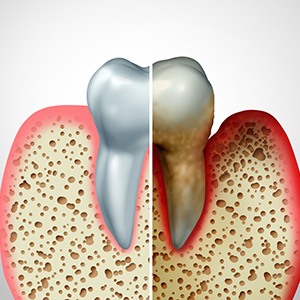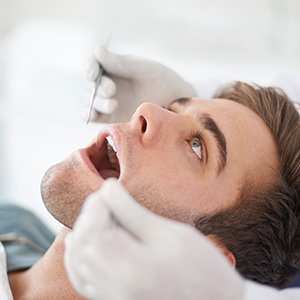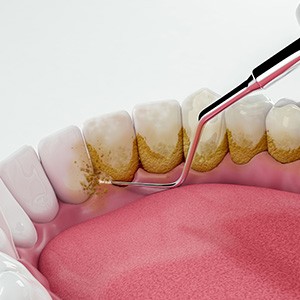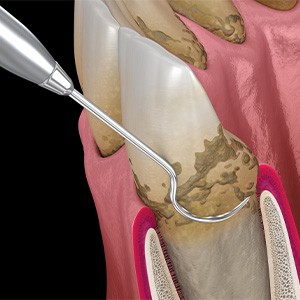Gum Disease Treatment Lincoln
Therapy for Infected Gums
What is periodontal therapy? Periodontal therapy starts with the scaling, root planing, and careful cleaning of your tooth root surfaces to remove plaque and tartar from deep inside periodontal pockets (the spaces between your gums and teeth). Scaling and root planing periodontal therapy in our Lincoln, NE dental office is essential to maintaining your tooth and gum health.
When it comes to maintaining good oral health, prevention is important. Be proactive with your dental health and make an appointment with the highly qualified dentists and dental hygiene professionals of Williamsburg Dental today. Williamsburg Dental can help you effectively protect your teeth from decay and gum disease. However, this inflammatory infection is overwhelmingly common, so don’t feel bad if you succumb to it. Our caring team can give you the therapy necessary to control the disease and restore your smile to full health and confidence.
Why Choose Williamsburg Dental for Gum Disease Treatment?
- In-Network with Most Dental Insurance Plans
- Convenience with Six Lincoln Locations
- Truly Comprehensive Dental Treatment with Our Team
What is Gum Disease?

Also called periodontal disease, gum disease is a bacterial infection that inflames the gums and disconnects teeth from the supporting jawbone and other tissues. Around the world, it is the top reason for adult tooth loss, and at least 70 percent of American adults over the age of 65 have an advanced stage of it. On top of that, the inflammatory bacteria that cause gum disease has been repeatedly linked to heart disease, certain types of cancer, kidney disease, and Alzheimer’s disease. As a result, you rally do need to take this matter seriously.
Symptoms of Gum Disease

Healthy gums are firm and pale pink in color. If your gums are puffy, red, bleed easily, or show any of the following signs of gum disease, you should make an immediate periodontal therapy appointment:
- Swollen gums
- Bright red or purplish gums
- Tender or sensitive gums
- Receding gum line
- Gaps or spaces developing between your teeth
- Pus between teeth and gums
- Persistent bad breath
- Constant bad taste in the mouth
- Loosened or wiggly teeth
- A change in your bite
How Do We Treat Gum Disease?

When caught early on during the first stage of development (called gingivitis), the bacteria that cause gum or periodontal disease can be kept under control with a normal professional teeth cleaning and diligent daily oral hygiene. However, more advanced cases require extra thorough treatment to fight off the chronic infection. That’s where scaling and root planing come in.
Scaling & Root Planing

More serious periodontal therapy starts with scaling and root planing and is essential to restoring your tooth and gum health if you reach more advanced stages. This two-in-one treatment works together to give your gums a chance to reattach to your teeth and stop the progression of the infection. At first glance, scaling seems just like a normal teeth cleaning, but it and root planing are intended to remove and block the culprits behind inflammation: plaque, calculus, and bacteria.
Do You Need Scaling & Root Planing?

If your gums have reached the point of receding or pulling away from your teeth, scaling and root planing become necessary. Before that point, normal cleanings may suffice to reverse red, swollen, bleeding gums, but once gums have created pockets where plaque and bacteria can hide, a more intensive procedure must be executed to take off the stuck, white substance from your teeth to control the infection.
The Process of Scaling & Root Planing

With scaling, we go deep below the gum line to make sure that plaque and bacteria are completely cleared out of periodontal pockets and off exposed roots. This thorough removal should cut off bacterial growth from getting worse for now. Root planing entails making the rough exposed root surface nice and smooth to prevent gum disease from happening again as easily down the road. Keep in mind that this process may need to be repeated a few times to control the bacteria.
Aftercare Tips for Scaling & Root Planing

Unfortunately, there will always be a possibility that gum disease could come back; in other words, there isn’t a permanent cure. If you carry on with your old habits, it will surely continue to plague your smile and health. However, healthy habits in your life can keep this inflammation-causing disease from returning. For instance, you will need to do the following:
- Come to Williamsburg Dental for periodontal maintenance appointments or checkups and cleanings every four months to prevent reinfection.
- Brush your teeth for two minutes both morning and evening.
- Floss at least once per day.
- Cut back on sugary, acidic foods and drinks.
- Avoid vaping, smoking, or using other tobacco, which significantly raises your risk of gum disease.
- Eat a nutritious diet with fruits and vegetables, lean protein, etc.
- Drink plenty of water every day.
- Let us know what medications you’re taking to see if any cause dry mouth as a side effect. In this case, we can recommend a hydrating mouthwash to help.
